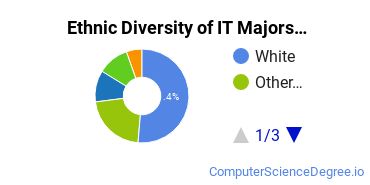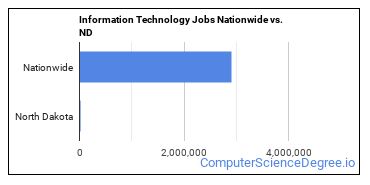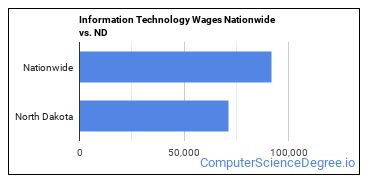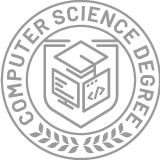Information Technology Schools in North Dakota
In <nil>, 56 students earned their IT degrees in ND.
An Information Technology major is the 3rd most popular major in this state.
Featured schools near , edit
Education Levels of Information Technology Majors in North Dakota
IT majors in the state tend to have the following degree levels:
| Education Level | Number of Grads |
|---|---|
| Master’s Degree | 21 |
| Award Taking Less Than 1 Year | 12 |
| Associate Degree | 12 |
| Bachelor’s Degree | 11 |
Gender Distribution
In North Dakota, a it major is more popular with men than with women.

Racial Distribution
The racial distribution of it majors in North Dakota is as follows:
- Asian: 3.6%
- Black or African American: 10.7%
- Hispanic or Latino: 3.6%
- White: 78.6%
- Non-Resident Alien: 1.8%
- Other Races: 1.8%

Jobs for Information Technology Grads in North Dakota
6,490 people in the state and 2,912,080 in the nation are employed in jobs related to it.

Wages for Information Technology Jobs in North Dakota
A typical salary for a it grad in the state is $71,180, compared to a typical salary of $92,030 nationwide.

Most Popular Information Technology Programs in ND
There are 6 colleges in North Dakota that offer it degrees. Learn about the most popular 6 below:
This public school has an average net price of $17,424. Of all the teachers who work at the school, 90% are considered full time. Of all the students who attend this school, 94% get financial aid.
81% of students get financical aid. A typical student attending BSC will pay a net price of $11,096. Students enjoy a student to faculty ratio of 14 to 1.
The student to faculty ratio is 21 to 1. Of all the teachers who work at the school, 96% are considered full time. Graduates earn an average $40,533 after graduation.
An average student at Rasmussen University - North Dakota will pay a net price of $18,365. It takes the average student 4.00 years to graduate. 30% of the teachers are full time.
Grads earn an average early-career salary of $26,508 after earning their degree at this institution. 91% of students are awarded financial aid at this school. 78% of the teachers are full time.
A typical student attending North Dakota State University will pay a net price of $17,692. It takes the average student 4.49 years to graduate. Of all the teachers who work at the school, 98% are considered full time.
Information Technology Careers in ND
Some of the careers it majors go into include:
| Job Title | ND Job Growth | ND Median Salary |
|---|---|---|
| Information Security Analysts | 43% | $79,330 |
| Database Administrators | 24% | $66,890 |
| Computer Network Architects | 21% | $92,570 |
| Web Developers | 21% | $58,360 |
| Computer and Information Systems Managers | 17% | $115,420 |
| Computer Network Support Specialists | 16% | $62,630 |
| Computer User Support Specialists | 16% | $48,830 |
| Computer Workers | 16% | $68,870 |
| Network and Computer Systems Administrators | 16% | $66,470 |
| Managers | 10% | $103,020 |
Related Majors in North Dakota
Below are some popular majors in the state that are similar to it.
| Major | Annual Graduates in ND |
|---|---|
| Computer Science | 113 |
| Computer Information Systems | 96 |
| Computer Systems Networking | 35 |
| Computer Systems Analysis | 14 |
| Computer Software Applications | 9 |
| Data Processing | 8 |
| Information Science | 2 |
View all majors related to Information Technology
Explore Major by State
Alabama
Arkansas
Connecticut
Florida
Idaho
Iowa
Louisiana
Massachusetts
Mississippi
Nebraska
New Jersey
North Carolina
Oklahoma
Rhode Island
Tennessee
Vermont
West Virginia
View Nationwide Information Technology Report
References
- College Factual
- National Center for Education Statistics
- O*NET Online
- Image Credit: By Craig Dennis under License
More about our data sources and methodologies.
Featured Schools
 Request Info
Request Info
|
Southern New Hampshire University You have goals. Southern New Hampshire University can help you get there. Whether you need a bachelor's degree to get into a career or want a master's degree to move up in your current career, SNHU has an online program for you. Find your degree from over 200 online programs. Learn More > |




